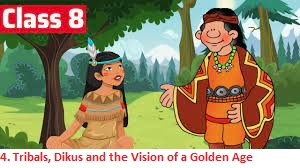4. Tribals, Dikus and the Vision of a Golden Age
NCERT SOLUTION FOR CLASS 8 SOCIAL SCIENCE HISTORY CHAPTER-4.
Answer.: (a) savage (b) broadcast (c) land (d) tea
plantations, coal mines
Question. 2. State whether true or false:
(a) Jhum cultivators plough the land and sow seeds.
(b) Cocoons were bought from the Santhals and sold by the traders at five times
the purchase price.
(c) Birsa urged his followers to purify themselves, give up drinking liquor and
stop believing in witchcraft and sorcery.
(d) The British wanted to preserve the tribal way of life.
Answer.: (a) False (b)
True (c) True (d) False
Question. 3. What problems did
shifting cultivators face under British rule?
Question. 4. How did the powers of
tribal chiefs change under colonial rule?
Answer.: The tribal chiefs were
important people. They enjoyed a certain amount of economic power and had the
right to administer and control their territories. Under the British rule, the
functions and powers of these tribal chiefs changed to a great extent:
1.
They were allowed to keep their land titles over a cluster
of villages and rent out lands, but they lost much of their administrative
power and were forced to follow laws made by British officials in India.
2.
They had to pay tribute to’ the British and discipline the
tribal groups on behalf of the British.
3. They lost the authority they had earlier enjoyed amongst their people, and were unable to fulfil their traditional functions.
Question. 5. What accounts for the anger of the tribals
against the dikus?
Answer.: The tribals wanted to
drive out the dikus—missionaries, moneylenders, Hindu landlords, and the
government because they saw them as the cause of their misery. The following
facts account for their anger against the dikus:
1. The land policies of the British were destroying their traditional land system.
2.
Hindu landlords and moneylenders were taking over their
land.
3.
Missionaries were criticising their traditional culture.
Question. 6. What was Birsa’s vision of a golden age? Why
do you think such a vision appealed to the people of the region?
Answer.: Birsa was deeply influenced
by many of the ideas he came in touch within his growing-up years. The movement
that he led aimed at reforming tribal society. He urged the Munda to give up
drinking liquor, clean their village, and stop believing in witchcraft and
sorcery. He often remembered the gloden past of the Mundas, when they lived a
good life, constructed embankments, tapped natural springs, planted trees and
orchards, practised cultivation to earn their living. They did not kill their
brethren and relatives. They lived honestly. Birsa wanted to restore this
glorious past.
Such a vision appealed to the people of the region because they were very much
eager to lead a free life. They had got fed up with the colonial forest laws
and the restrictions that were imposed on them.
EXTRA QUESTIONS
Question. 1.
Mention different types of activities of the tribal people.
Answer.:
(a) Some practised jhum cultivation,
(b) Some were hunter-gatherers. (c)
Some herded animals.
(d) Some took to settled cultivation.
Question. 2.Who was Birsa?
Answer.: Birsa
belonged to a family of Mundas, a tribal group that lived in Chottanagpur.
Question. 3.Why were some forests classified
as Reserved Forests?
Answer.: These
forests produced timber which the British wanted.
Question. 4.Why did the British introduce land
settlements?
Answer.: They did
so in order to get a regular revenue source for the state.







0 Comments
Post a Comment
Please do not enter any spam link in the comment box.